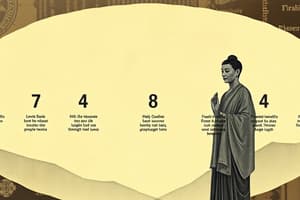Podcast
Questions and Answers
The Eightfold Path in Theravada Buddhism is categorized into four main sections: morality, concentration, wisdom, and distraction.
The Eightfold Path in Theravada Buddhism is categorized into four main sections: morality, concentration, wisdom, and distraction.
False (B)
Right speech, right action, and right means of livelihood emphasize the importance of moral behavior in attaining enlightenment.
Right speech, right action, and right means of livelihood emphasize the importance of moral behavior in attaining enlightenment.
True (A)
In Buddhism, the use of the word 'right' in the Eightfold Path refers to the necessity of performing actions with excess fervor rather than moderation.
In Buddhism, the use of the word 'right' in the Eightfold Path refers to the necessity of performing actions with excess fervor rather than moderation.
False (B)
Mindfulness and awareness are regarded as distractions in the pursuit of enlightenment in Buddhism.
Mindfulness and awareness are regarded as distractions in the pursuit of enlightenment in Buddhism.
The Middle Way teaches the followers of Buddhism to practice indulgence in extreme emotions and cravings.
The Middle Way teaches the followers of Buddhism to practice indulgence in extreme emotions and cravings.
Flashcards are hidden until you start studying
Study Notes
The Eightfold Path
- The Eightfold Path is a core concept in Theravada Buddhism, comprising eight practices leading to enlightenment.
- These eight practices are categorized into three groups: morality (sila), concentration (samadhi), and wisdom (prajna).
- Morality (sila): Right speech, right action, and right livelihood.
- Concentration (samadhi): Right effort, right mindfulness, and right meditation.
- Wisdom (prajna): Right belief and right aspiration.
- The three groups are interconnected, with wisdom built upon concentration, and both founded on morality.
- The word "right" emphasizes moderation in practicing the Eightfold Path, not over or underdoing actions.
- Mindfulness and awareness are crucial for achieving liberation or enlightenment, as they prevent negative outcomes.
Buddhism and the Middle Way
- Buddhism originated in India, founded by Siddhartha Gautama, the Buddha.
- Buddhism addresses the issue of samsara (cycle of birth and death) differently than other Indian religions.
- The Eightfold Path, also known as the Middle Way, is proposed as a solution to humanity's existential problems.
- The Middle Way encourages moderation and building a healthy relationship with feelings and cravings.
- Mindfulness of actions is critical for practicing the Middle Way.
- Modern life's distractions make it difficult to constantly check feelings and desires, leading to suffering.
- The challenge for everyone is to re-evaluate their actions and ensure they are practicing in the right amount.
Studying That Suits You
Use AI to generate personalized quizzes and flashcards to suit your learning preferences.




